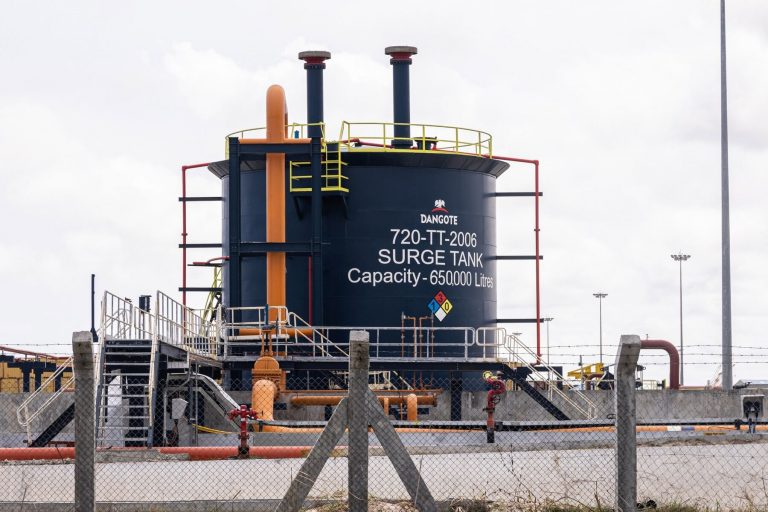
In a move to reduce the higher costs associated with road distribution and ease the burden on Nigeria’s congested road infrastructure, Dangote Refinery has announced its intention to transport 75% of its local petroleum product supply via sea routes.
This decision is part of a broader effort to improve the efficiency of product evacuation from the refinery while lowering transshipment costs for consumers. Key destinations targeted by this shift include Warri, Port Harcourt, and Calabar, among others.
Speaking to Arise News on Sunday as the refinery began distributing Premium Motor Spirit (PMS), Devakumar Edwin, Vice President (Oil & Gas) at Dangote Industries Limited, revealed the new transportation plans, highlighting the benefits of leveraging Nigeria’s sea routes.
Tekedia Mini-MBA edition 16 (Feb 10 – May 3, 2025) opens registrations; register today for early bird discounts.
Tekedia AI in Business Masterclass opens registrations here.
Join Tekedia Capital Syndicate and invest in Africa’s finest startups here.
“We have both exporting facilities by sea and by road. 75% of the production can be evacuated through sea. In fact, now we are ramping up to make it even 100%,” Edwin stated, noting the company’s commitment to adopting sea transportation to reduce reliance on Nigeria’s overburdened road network.
The refinery, the largest single-train facility globally, boasts an impressive capacity to load 40 tankers of PMS simultaneously within 40 minutes and can manage up to 2,900 trucks daily. However, this immense capacity poses a significant risk of traffic congestion along the Lekki-Epe corridor, where the refinery is located.
By prioritizing sea routes for product evacuation, the refinery aims to circumvent these potential bottlenecks.
“Anything going to Calabar, Port Harcourt, Warri, Apapa, Atlas can all be taken through the sea. So only what is imminently required by road can be taken. But I also have the facility to load 83% of my production also through road,” he said.
This flexibility allows the refinery to meet urgent demands by road while minimizing traffic congestion and the associated logistical bottlenecks.
Sea Transportation as a Solution to Cost and Regional Access
In addition to alleviating road congestion, the switch to sea transport is expected to significantly reduce the costs associated with road haulage, such as wear and tear on vehicles, fuel expenses, and delays due to poor road conditions or traffic. The refinery’s sea transportation plans, according to Edwin, will play a key role in cutting transshipment costs and ultimately lowering product prices for consumers.
The strategic use of sea routes will also enhance access to various parts of Nigeria. For instance, products destined for central Nigeria, including cities like Abuja and Jos, can be shipped from Port Harcourt and Warri, while those heading to the East and Northeast will be dispatched from Calabar.
“We can avoid all traffic congestion on the road by evacuating through sea and it will also bring down the cost of transhipment,” Edwin said.
While sea transportation offers multiple benefits, including cost reductions and reduced traffic, the refinery’s road capacity remains available to address urgent supply needs, particularly in regions that may not be fully serviced by sea routes. This built-in flexibility ensures that there will be no interruptions in supply, even as Dangote Refinery shifts toward maritime solutions.
The Nigerian National Petroleum Company Limited (NNPCL) moved approximately 300 trucks to the 650,000-barrel-per-day Dangote Refinery in Lagos, initiating the first loading on Sunday, September 15, 2024.
As the largest single-train refinery in the world, Dangote Refinery’s operational capacity is immense, with the ability to manage thousands of trucks daily. However, the move to sea transportation reflects the company’s commitment to sustainable and cost-effective distribution.
In a statement on Monday, the refinery assured Nigerians of the availability of quality petroleum products and putting an end to the endemic fuel scarcity in the country.
Nigerians have placed high hopes on Dangote Refinery to address energy insufficiency and insecurity, which has bedeviled the economy in the past 50 years. The refinery’s vast capacity to produce and distribute petroleum products locally holds the potential to significantly reduce the country’s reliance on imported fuel. Thus, the plan to transit to sea transportation for effective distribution of petroleum products across the country, which paves the way for a more efficient and cost-effective supply chain, has been widely lauded.
However, some energy analysts caution that while the refinery’s use of sea transportation is a welcome development, it may take some time before these cost savings translate to noticeable reductions at the pump.



